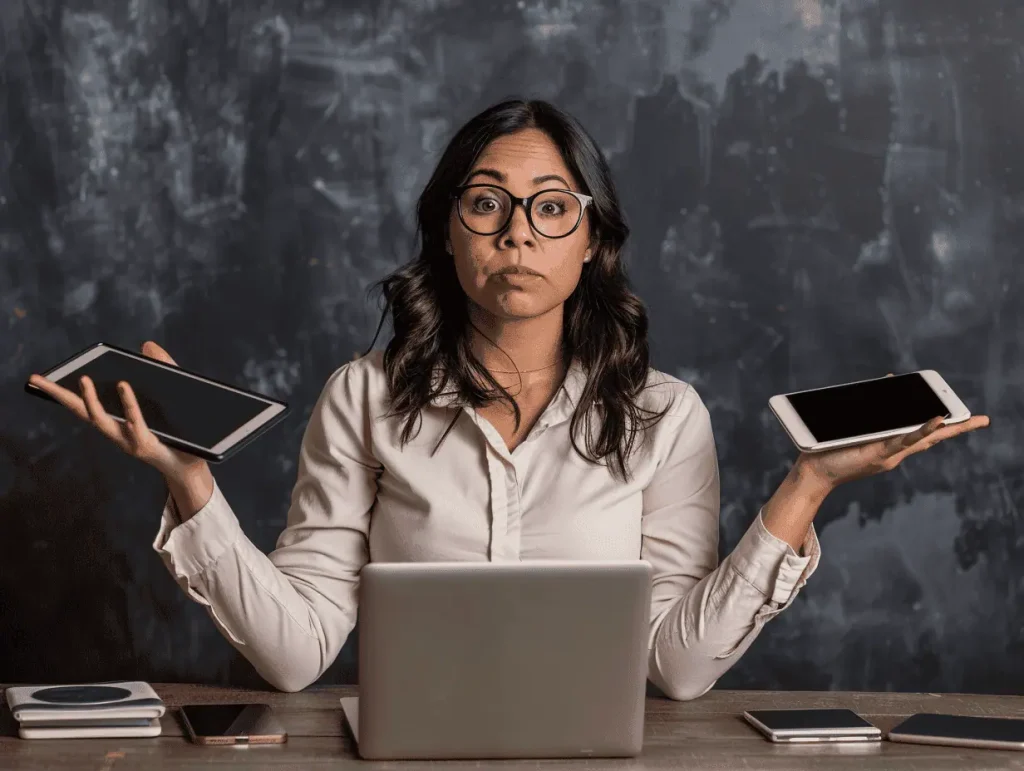Table of Contents
In today’s hyper-connected world, digital overload has become a common challenge. With the constant influx of emails, notifications, social media updates, and digital tasks, many people find themselves overwhelmed and struggling to maintain balance. Managing digital overload is essential for maintaining productivity, mental well-being, and overall quality of life. This article explores practical strategies to help individuals effectively manage digital overload and reclaim control over their digital lives.

1. Set Clear Boundaries
Establishing clear boundaries between digital and offline time is crucial in managing digital overload.
- Designate Digital-Free Zones: Create specific areas or times in your daily routine where digital devices are not allowed. For example, establish a rule to keep devices out of the bedroom or during family meals to foster face-to-face interactions and ensure quality downtime.
- Set Device-Free Times: Allocate certain periods each day for device-free activities. Designate times for digital detox, such as during meals, an hour before bedtime, or during breaks, to reduce the constant exposure to screens.
- Establish Work-Life Balance: Define boundaries between work and personal life by setting specific times to check emails and handle work-related tasks. Avoid working outside these designated times to prevent burnout and maintain a healthy work-life balance.
2. Manage Notifications
Notifications can be a major source of distraction and contribute significantly to digital overload. Managing these notifications effectively can help reduce interruptions and improve focus.
- Customize Notification Settings: Adjust notification settings on your devices and apps to receive only essential alerts. Disable non-essential notifications, such as social media updates or promotional messages, to minimize distractions.
- Use Do Not Disturb Mode: Utilize the “Do Not Disturb” feature on your devices during work periods or personal time. This mode helps prevent interruptions and allows you to focus on tasks without constant notifications.
- Schedule Notification Checks: Designate specific times to check notifications rather than responding to them immediately. This approach helps maintain focus on tasks and prevents constant context switching.
3. Prioritize and Organize Tasks
Effective task management is key to handling digital overload and improving productivity.
- Create a Task List: Use digital tools or traditional methods to create a task list and prioritize tasks based on importance and deadlines. Break down larger tasks into smaller, manageable steps to avoid feeling overwhelmed.
- Utilize Task Management Apps: Leverage task management and productivity apps to organize and track tasks. Apps like Todoist, Trello, or Asana can help you manage tasks efficiently and stay on top of deadlines.
- Avoid Multitasking: Focus on one task at a time rather than juggling multiple tasks simultaneously. Multitasking can lead to decreased productivity and increased stress. Prioritize tasks and tackle them sequentially for better results.

4. Practice Digital Minimalism
Embracing digital minimalism involves simplifying your digital life and focusing on what truly matters.
- Declutter Your Digital Space: Regularly review and organize your digital files, apps, and subscriptions. Delete unnecessary or unused apps, unsubscribe from irrelevant newsletters, and clean up your email inbox to reduce digital clutter.
- Limit Social Media Usage: Assess your social media usage and consider setting time limits or designated times for checking social media platforms. Reducing time spent on social media can help decrease digital overload and improve mental well-being.
- Embrace Technology Intentionally: Use technology with purpose and intention. Evaluate whether each app, device, or digital tool adds value to your life and consider removing or limiting those that do not align with your goals.
5. Practice Mindfulness and Digital Detox
Mindfulness practices and digital detox strategies can help alleviate the stress associated with digital overload.
- Mindfulness Techniques: Incorporate mindfulness techniques into your daily routine, such as meditation or deep breathing exercises. Mindfulness can help you stay present and reduce the impact of digital distractions on your mental well-being.
- Scheduled Digital Detoxes: Plan regular digital detox periods to disconnect from screens and digital devices. Use this time to engage in offline activities, such as reading, exercising, or spending time in nature, to recharge and rejuvenate.
- Engage in Offline Activities: Prioritize offline activities that promote relaxation and creativity. Hobbies, physical exercise, and social interactions without digital devices can provide a refreshing break from the constant digital engagement.
6. Develop Healthy Digital Habits
Cultivating healthy digital habits is essential for managing digital overload effectively.
- Establish a Routine: Create a daily routine that includes designated times for digital activities, work, and leisure. Having a structured schedule helps maintain balance and prevents digital overload.
- Practice Time Management: Use time management techniques, such as the Pomodoro Technique or time blocking, to allocate specific periods for focused work and breaks. This approach helps manage digital tasks efficiently and prevents burnout.
- Be Mindful of Screen Time: Monitor and set limits on screen time to avoid excessive usage. Many devices and apps offer built-in tools to track and manage screen time, allowing you to stay mindful of your digital habits.
7. Seek Support and Resources
Seeking support and utilizing available resources can enhance your ability to manage digital overload effectively.
- Professional Support: If digital overload is impacting your mental health or productivity, consider seeking support from a mental health professional or counselor. They can provide guidance and strategies for managing stress and improving digital habits.
- Educational Resources: Explore resources and courses on digital wellness and productivity. Many organizations and experts offer workshops, books, and online courses that provide valuable insights and strategies for managing digital overload.
- Community Support: Connect with others who are also working on managing digital overload. Sharing experiences, tips, and strategies with peers can provide support and motivation to maintain healthy digital habits.

8. Conclusion
Managing digital overload is crucial for maintaining productivity, mental well-being, and a balanced lifestyle in today’s digital age. By setting clear boundaries, managing notifications, prioritizing tasks, practicing digital minimalism, and incorporating mindfulness techniques, individuals can effectively manage digital overload and regain control over their digital lives. Developing healthy digital habits, seeking support, and utilizing available resources further enhance the ability to navigate the challenges of digital overload. Embrace these strategies to create a more balanced and fulfilling digital experience, ultimately improving overall quality of life.
